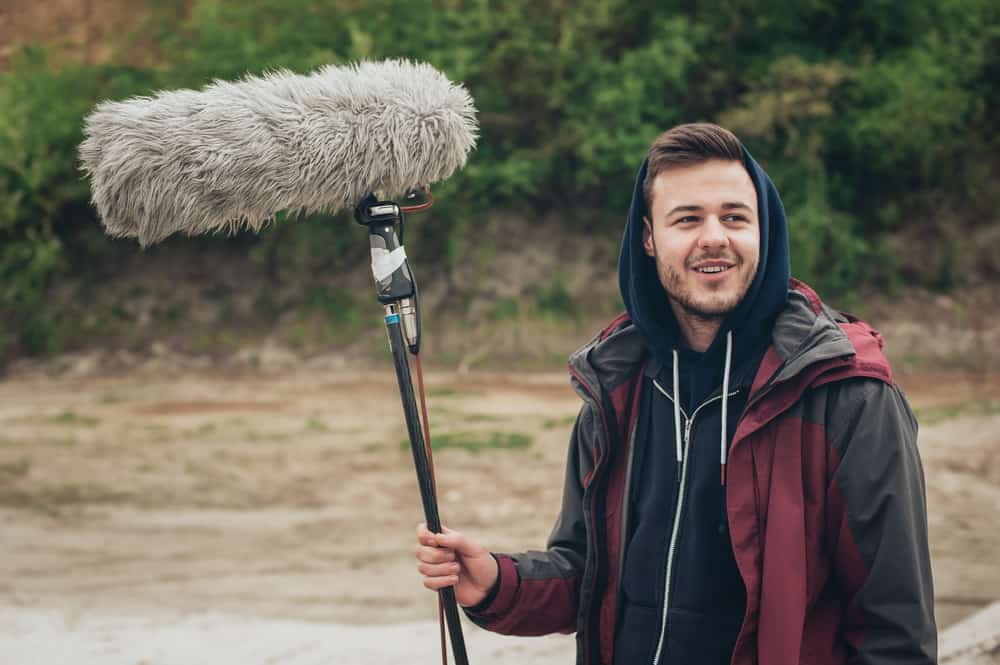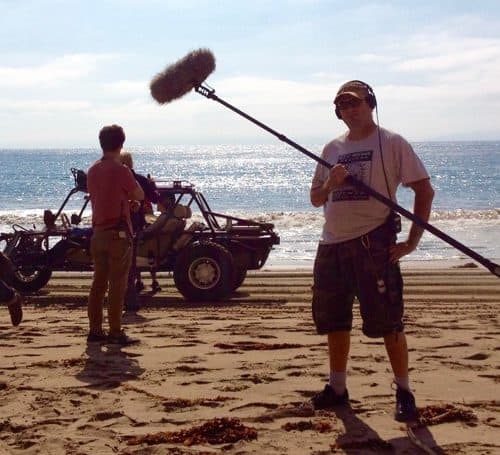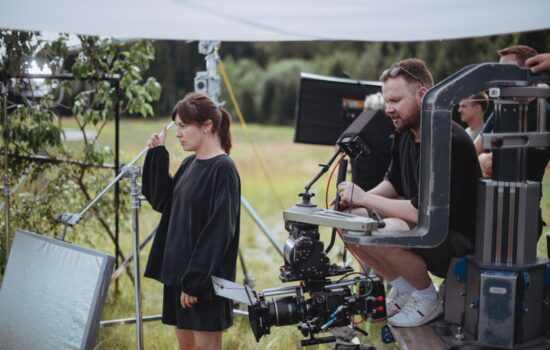Boom Operator
Career Overview
The role of a Boom Operator is to place and hold the boom microphone to record the dialogue for Actors during a film or television shoot and to know the basics of the use of wireless microphones and recording equipment.
Alternate Titles
Boom Person, Boom Man, Boom Woman
Avg. Salary
$72,0001
Salary Range
$37K-$121K1

How To Become a Boom Operator
People also ask
Career Description
For Tim Lloyd, a Boom Operator who has worked on numerous film and television productions, a typical day follows a usual routine. It all begins with arriving on set and locating the equipment truck. From there, he’ll help to unload the equipment and organize it on the sound and utility carts. Next, it’s time to find where the electricity is.
Lloyd will chat with the Gaffer or Electricians about where he can plug in and charge his batteries and power up the Sound Mixer’s equipment. He’ll then assemble his boom, provide headphones to all the necessary crew, including the Director, Script Supervisor and sometimes the Director of Photography and Producers, so they can hear the dialogue.
Next he’ll synchronize the time code slate and lock sync boxes and give them to the camera department, as well as hook up the video cables to the on-set monitors or video play back and/or data capture.
Next comes rehearsal. This gives Lloyd the chance to see where the talent will be during the scene, as well as where the camera will be placed.
After rehearsal, the set is turned over to the crew. It’s during this time that Lloyd can troubleshoot to make sure his microphone and boom pole are out of frame and not creating any shadows or reflections. Each time the camera moves these steps need to be repeated until the scene is covered. On lower-budget shoots, he also may have to wire talent.
Once the scene is shot, he starts all over again with set up and rehearsal for each new scene and location.
Salary
The salary range for Boom Operators runs from $37,000 to $121,000. The median salary for a Boom Operator is approximately $72,000.
Lloyd states that almost all Boom Operators begin as contracted or freelance workers. However, once they start working on bigger budget projects and join the union, they essentially become salaried employees while on the job. That means they’re paid through an employment company that takes out for taxes. Union earnings also allow Boom Operators to get holiday pay and build hours towards both their pensions and health care coverage.
More experienced Boom Operators can ask for higher rates, but the budget of the show or film, as well as the studio or production company financing it, can also affect the amount paid for any given production.
How much do Boom Operators get paid?
There is a wide range when it comes to salary for a Boom Operator. Someone just starting out in this position who is working generally on smaller films with smaller budgets might earn close to $40,000 in a single year – if they’re working on a consistent basis. But with enough experience, acceptance into the union, and the ability to work on higher-profile jobs with better budgets, that number can increase to well over $100,000 in a year.
Hey, what do you think about trying our new Film Career HelperFilm Career Helper really quick? It’s totally free and could help get your career moving fast! Give it a try. It’s totally free and you have nothing to lose.
Career Outlook
As Lloyd has mentioned, the typical day for a Boom Operator is a long one. That means a workweek of at least 60 hours. So for someone in this role, there could be periods of time when they don’t have much of a social life or the ability to do anything outside of work.
He also states that for someone just starting out, they have to both gain experience and pay the bills, so that might mean taking on even more hours a week. Eventually, though, a successful Boom Operator will be able to take higher-paying jobs and pass on the lower-paying ones meant more for beginning professionals.
Aspiring Boom Operators should also build a network of other sound people so that they can both fill in for others and ask for cover when needed.
However, Lloyd is quick to mention that the life of a Boom Operator can often be “feast or famine.” Even for someone who’s been in the business for a while, there might be periods of a month or more where no jobs are available. That’s why it’s helpful to have a side gig that allows a Boom Operator to make ends meet until that next production job comes along.
Is Boom Operator a good job?
Like most other jobs, it can be. Do you like being on a film set? Are you interested in sound technology? Can you withstand the physical demands of boom operating on a multi-day project? Most importantly, can you afford to withstand the inevitable lulls between jobs that is so common in the film industry? If you can answer yes to all of these questions, becoming a Boom Operator might just be the right profession for you.
Career Path
As far as how Lloyd became a Boom Operator, he says that his particular path is a pretty standard one. He always knew that he wanted filmmaking to be his career, but because he didn’t know which specialty he wanted to enter and didn’t have knowledge of the industry, he went to film school.
He credits his education with giving him the foundation he needed to get that foot in the door. But even after arriving in LA, he didn’t have boom experience.
So he started volunteering on student films and micro-budget films to get that experience. While these productions didn’t typically pay, they did give Lloyd the chance to gain both expertise and connections. He became friends with a Boom Operator, and from that contact came his first paying job. Says Lloyd, “The more people you know, and the more you can build your resume, the more calls you’ll get for jobs.”
Because volunteer positions are often the only way that aspiring Boom Operators can gain on-the-job experience, Lloyd can’t overestimate how important these opportunities are. But that might mean finding other means to an income while initially working on a volunteer basis.
But with the right connections, those volunteer gigs can turn into paying ones. He also recommends any internships or Production Assistant positions that can provide on-set exposure. Finding work at a television station or cable access station can help for building a resume, too. Many high schools now even have their own TV stations and media programs, so it’s never too soon to start!
When working on a larger budget set, Lloyd most often is working with a utility sound person otherwise known as second Boom Operator or third person. This allows him to be on or near the set, freeing him to concentrate on being a Boom Operator. He also works closely with the sound department’s head, the Sound Mixer. Many Boom Operators also do work as Utility and Sound Mixers.
- Join professional communities like Facebook groups geared towards Boom Operators.
- Experiment with sound by shooting videos.
- Study any sound equipment available to learn how it works.
- Research and apply for any applicable local jobs or volunteer positions.
- Practice with a friend using a mop or pole with some weight on the end!
Who is a famous Boom Operator?
Very, very rarely is a Boom Operator known to anyone outside the film industry. One notable exception is Ken Nightingall, who gained fame for wearing pink shorts while booming on the original Star Wars film.
Experience & Skills
Tim emphasizes that someone just starting out on the path to becoming a Boom Operator take any media-related job—even volunteer positions. Gaining on-set experience early will prove invaluable later on when issues arrive.
For instance, he says “electric cables and sound cables don’t like each other.” But for someone who has worked on numerous productions, it becomes easier to troubleshoot. Whether the problem is cables or speakers or another piece of equipment, a Boom Operator who has had more experience will be able to intuitively know how to solve it. And that’s why those first jobs are so important!
Learning the proper booming techniques in a lower-stake environment also allows for making mistakes and learning how to avoid them. Some people have a natural ability to do this job quickly, but there is no substitute for experience. Being tall can give some Boom Operators a bit of an edge, but anyone can learn tricks to overcome a lack of height. Agility, being aware of the surroundings, upper body strength and a strong back are a plus as well.
Lastly, Lloyd mentions that any experience with other sound-related jobs, such as working in radio, DJing or being a musician, can also prove useful in a career as a Boom Operator.
Being a successful Boom Operator means communicating well with other crew members, so to some degree, Lloyd offers that individuals with more extroverted personalities can do well in this role. That being said, being stealthy and having a “fly on the wall” approach is important when the cameras are rolling. Also, knowing how to be diplomatic with each department—meaning, knowing how to speak with tact and respect—is key.
Sometimes different departments will have objectives that conflict with those of the sound department. It can be anything from wanting to shoot in a location with a lot of background noise to having an Actor wear noisy jewelry. The Boom Operator is often the last line of defense. Though it’s important to not become obsessed with distracting details, being helpful and pointing out potential issues is part of the job.
It’s also important not to distract the Actors. Keep on-set interactions to a minimum and always be conscious of where they’re looking during a scene to stay out of it! If an Actor is wearing a wire and it’s visible or needs to be adjusted, that may fall on the Boom Operator because they are the on-set sound department representative. This is when a friendly and polite personality can be a big help.
Education & Training
Lloyd recommends any kind of education that will “get your mind thinking about sound for film.” That might mean a four-year college like he attended, but it could also mean junior college or volunteer experience. What’s important when aspiring to become a Boom Operator is learning about the equipment used to both understand the job and be able to communicate with other crew. A college education can help but is not necessary for learning those film essentials.
Lloyd adds that any media-driven experience will also help with learning sound lingo, which is likewise important for becoming a successful Boom Operator.
Feel free to read our guide to dubbing in a movie!
Additional Resources
A Boom Operator who is part of the union has access not only to benefits such as health insurance and pension pay, but also continued learning classes to help them maintain a professional advantage. Lloyd mentions that the unions also require a range of safety certification classes, such as scaffolding and electrical training, to help their members practice proper safety procedures while on the job.
Beyond union benefits, though, Lloyd offers that it can be useful to join any number of Facebook groups that cater specifically to the Boom Operator profession. He’s a member of several, including Microphone Boom Operators and Boom Operator, that have proven helpful with learning tips and tricks, as well as networking with others.
FAQ
What is the single biggest suggestion you would give to someone wanting to get into this career?
Lloyd states, “Prepare yourself for what the life of a beginning Boom Operator is really like.”
That means a lot of time devoted to the profession without necessarily making a lot of money doing it. It takes a great deal of patience to build a resume that will translate into better hours and income. Until then, aspiring Boom Operators will likely have to make sacrifices to their social and financial lives. Show business is a bit like running off to join the circus.
“You may not ever have the security of a typical nine-to-five job, but you won’t often be bored!”
What’s the #1 mistake people make when trying to get into this career?
“They think they’re immediately going to work on a hit television show or blockbuster film,” answers Lloyd. The reality is that student films and micro-budget films will likely be the majority of the productions that a beginner Boom Operator will work on. But again, with time and patience will come more high-profile opportunities. He cautions, though, that it could be several years before those projects become steady job options.
What is the question people should ask about this career but rarely do?
Lloyd offers, “Is this kind of time-consuming career what I really want?”
The life of a Boom Operator often means getting up at four or five in the morning to get to set on time, working a very physical 12-hour day, coming home and then doing it all over again the next day. He compares this profession to life in the military, as both demand adhering to a precise schedule and executing the role well. But for him, it’s also a hugely fascinating and rewarding profession.
If you could describe in one word what makes you successful, what would it be?
“Persistence.”
Sources

Tim D. Lloyd
Boom Operator Tim D. Lloyd is originally from the Midwest: the Kansas City area, to be exact. From an early age, he has always had an interest in music, radio, film, and television. As a young man, he took journalism classes at Johnson County Community College, volunteered at a cable access station, and bought a camera and shot video of local area bands. An internship at classic rock station KCFX turned into a weekend Board Operator job and DJ shifts.
Upon moving to Chicago, he attended Columbia College where he earned a bachelor’s degree in Film and Video. After finishing school, he took media-related jobs working as a Satellite Video Switcher and as a Camera Operator and Audio Engineer for several A/V companies in the Chicago area. In 2002 he moved to Los Angeles to pursue a career in the film industry.
He is currently working as a Boom Operator and Utility Sound Person for commercials, film, and television. His credits include The Huntsman: Winter’s War, Paranormal Activity: 2, Insidious and Drunk History.
References
- 1THR Staff. "Hollywood's Salary Report 2017: Movie Stars to Makeup Artists to Boom Operators". The Hollywood Reporter. published: September 28, 2017. retrieved on: April 13, 2020



















